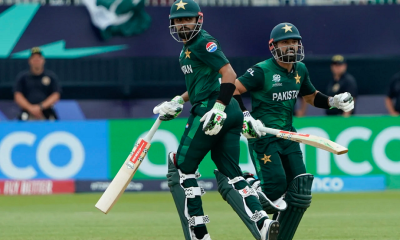Foreign News
Pakistan’s election chaos casts shadow on next IMF deal
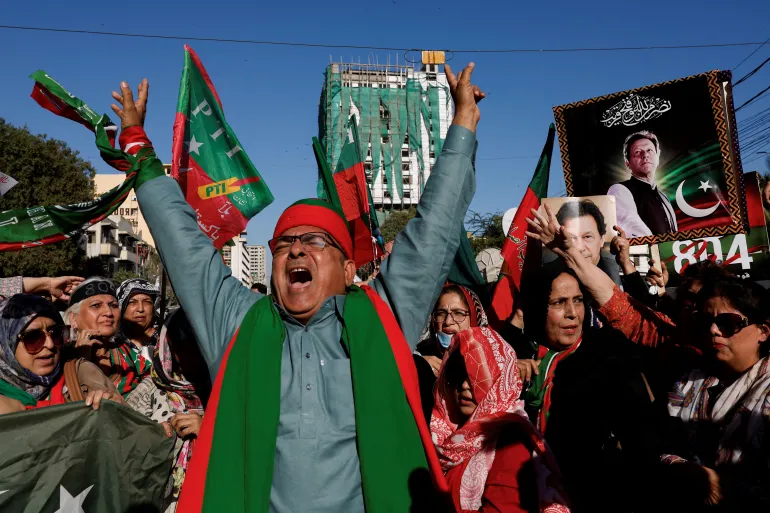
As Pakistan grapples with the aftermath of controversial elections, political chaos is threatening to cloud its $3bn deal with the International Monetary Fund (IMF), which analysts say is key to the country’s economic stability.
On Thursday, the global lender said Pakistan’s interim government had “maintained” economic stability. The IMF’s communications chief, Julie Kozack, said the interim government had managed to achieve fiscal targets while also “protecting” the social safety net. “We look forward to working with the new government on policies to ensure macroeconomic stability and prosperity for all of Pakistan’s citizens,” Kozack said.
But the comments from the IMF come at a time when Pakistan is about to swear in a new government after this month’s general election, which has been marred by widespread allegations of rigging and manipulation.
Former Prime Minister Imran Khan the founder of his Pakistan Tehreek-e-Insaf (PTI) party, drew a link between these allegations and the IMF loan in a statement from prison, asking the international body to carry out an audit of the elections before proceeding with the deal.
“Imran Khan will issue a letter to IMF. The charter of IMF, EU and other organisations stipulates that they can function or provide loan to a country only if there’s good governance,” Khan’s lawyer and Senator Ali Zafar told journalists after meeting the ex-premier at Rawalpindi’s Adiala Jail on Thursday. Khan is in jail over a series of convictions in cases involving a range of charges — from corruption to leaking secret documents.
Pakistan signed a nine-month standby agreement with the IMF last year. It will expire early next month, and securing another long-term plan is seen as a priority for the next government.
The February 8 elections in Pakistan saw a split mandate with PTI-backed candidates winning 93 seats in the National Assembly while the party’s main rivals, the Pakistan Muslim League-Nawaz (PMLN) and Pakistan Peoples Party (PPP) secured 75 and 54 seats, respectively.
The PMLN, PPP and smaller allies have agreed to form a coalition government, whose members are expected to take oaths next week.
The PTI was denied its electoral symbol — a cricket bat — weeks before the elections and was forced to field candidates as independents. The party also faced a nationwide crackdown that impeded its campaign but still beat the odds when its candidates won the highest number of seats. Khan was removed from office in 2022 after a no-confidence motion. Many analysts believe he came to power in 2018 with the support of Pakistan’s powerful military establishment, but they eventually fell out.
The PTI has alleged widespread manipulation in the counting and results and has said it will continue both street protests and legal cases to reclaim what it insists is a stolen mandate.
Lahore-based economist Hina Shaikh, however, said this political uncertainty wouldn’t affect the IMF’s approach. With the IMF already signalling its willingness to work with the new government, “any effort by Khan would not bear any fruit,” she said.
“Firstly, it would have no official ramifications, and secondly, it would not be in the interest of Pakistan nor IMF to end financial support. Pakistan has several payments due in the next two months and needs IMF support to stay afloat and continue leveraging other sources of revenue,” the economist told Al Jazeera.
Extending the IMF deal is critical for Pakistan, economists said. A failure on the part of the government to tackle the country’s massive economic challenges could send the nation of 241 million people into a default.
Pakistan’s foreign reserves currently stand at about $8bn, just enough to cover eight weeks of imports. The Pakistani rupee has lost more than 50 percent of its value against the US dollar over the past two years.
Inflation, which hit a record high of almost 38 percent last year, is currently nearly 30 percent, and high tariffs for electricity and gas along with other essential commodities are draining household incomes.
The looming debt obligations mean that Pakistan must be able to negotiate a new plan with the IMF as soon as the new government comes in. A recent report by Tabadlab, an Islamabad-based think tank, called Pakistan’s debt obligations “unsustainable”, saying its total external and internal debt totals up to $271bn.
A United States Institute of Peace report from last year concluded that the country needs to “repay $77.5 billion in external debt” by June 2026. “For a $350 billion economy, this is a hefty burden,” the report stated.
Pakistan’s central bank says it needs more than $6bn to service its debt obligations by June 30, the end of current fiscal year.
Emphasizing the need for a continuation of the IMF loan programme, Uzair Younus, principal at the US-based advisory firm The Asia Group, said Pakistan’s economy cannot afford politics when it comes to the next IMF deal. “Any delays due to politics or a staring contest between the next finance minister and the IMF is likely to rapidly fuel economic uncertainty, pressure on the currency and heightened default risk,” he told Al Jazeera.
(Aljazeera)
Foreign News
Rubio says US and Europe ‘belong together’ despite tensions
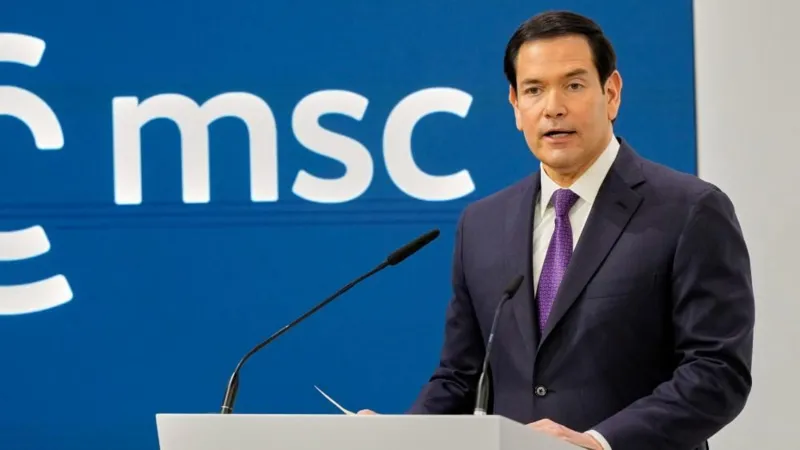
Marco Rubio has assured European leaders the US does not plan to abandon the transatlantic alliance, saying its destiny “will always be intertwined” with the continent’s.
The US secretary of state told the Munich Security Conference: “We do not seek to separate, but to revitalise an old friendship and renew the greatest civilisation in human history.”
He criticised European immigration, trade and climate policies, but the overall tenor of the closely-watched speech was markedly different to Vice President JD Vance’s at the same event last year, during which he scolded continental leaders.
European Commission President Ursula von der Leyen said she was “very much reassured” by Rubio’s remarks.
Rubio, the Trump administration’s most senior diplomat, said it was “neither our goal nor our wish” to end the transatlantic partnership, adding: “For us Americans, our home may be in the Western Hemisphere, but we will always be a child of Europe.
“And I am here today to leave it clear that America is charting the path for a new century of prosperity, and that once again we want to do it together with you, our cherished allies and our oldest friends.”
However, he repeated several criticisms repeatedly levelled at Europe by the Trump administration, including describing immigration policies as a threat to civilisation, and saying a “climate cult” had taken over economic policy.
On trade, he said Europe and the US had “made mistakes together” by adopting a “dogmatic vision of free and unfettered trade”.
He repeated familiar calls from the US for Europe to invest more in defence, saying: “We want allies who can defend themselves so that no adversary will ever be tempted to test our collective strength.”
In response, von der Leyen said: “Rubio is a good friend, a strong ally. And this was, for me, very reassuring to listen to him.”
She continued: “We want a strong Europe. And this is, I think, the message of today.”
Elsewhere in his half-hour address, Rubio said the system of international co-operation “must be rebuilt” and singled out the UN for particular criticism, saying it had “played virtually no role” in resolving the Gaza and Ukraine conflicts.
He also said the organisation was “powerless to constrain the nuclear programme” of Tehran.
In recent weeks, US President Donald Trump has threatened strikes on Iran if a deal to curb its nuclear programme can be reached, as negotiations between the two intensify.
A second round of talks will be hosted by Oman in Geneva next week, the Swiss foreign ministry said on Saturday.
Outside the conference, an estimated 200,000 protesters held a rally against the Iranian government, local police report.
The demonstrators denounced the country’s leadership, following the government crackdown on January’s protests in which thousands of people were killed.
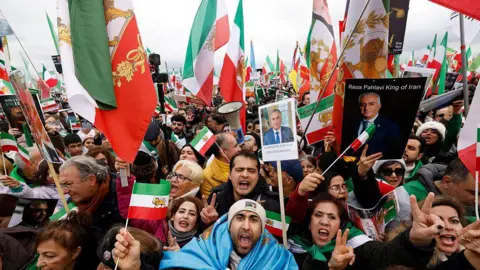
Rubio also said the US did not know whether the “Russians are serious about ending the war” in Ukraine, before adding: “But we’re going to continue to test it.”
Ukraine’s President Volodymyr Zelensky told the conference later on Saturday that no one in Ukraine believed his Russian counterpart Vladimir Putin would leave the country alone, describing the Russian leader as a “slave to war”.
Zelensky has come under pressure from the White House to hold presidential elections, which have been suspended while the country is under martial law.
Asked about a Financial Times report that his administration was planning for elections as soon as May, Zelensky said it was “something new to me” and repeated that “nobody supports elections during the war”.
He said that Ukraine would need “two months of ceasefire” and “security infrastructure” to safely conduct elections.
[BBC]
Foreign News
Two Britons among three dead in French Alps avalanche

Two Britons and one French person have died in an avalanche in the French Alps on Friday.
The British pair were part of a group of five people skiing off-piste with an instructor in the Manchet valley, near Val d’Isère, a spokeswoman for the resort told the BBC.
The French national was skiing alone when the avalanche struck at 11:30 local time (10:30 GMT), Albertville prosecutor Benoit Bachelet said in a statement announcing the deaths.
Another British person has minor injuries, he added.
A spokesperson for the Foreign Office told the BBC they are aware of the death of the two British men and they are “in contact with the local authorities and stand ready to offer consular assistance”.
A manslaughter investigation has now been launched by the Albertville public prosecutor’s office and will be carried out by CRS Alpes mountain rescue police.
The ski instructor, who was unharmed, tested negative after taking alcohol and drug tests, according to Bachelet.
Val d’Isère already experienced avalanches this winter, with one person dying in the resort of Tignes nearby last month.
France’s national weather service had issued a red alert for avalanche risk across the Savoie region on Thursday, which was then lifted on Friday. But the risk level remained high across the Alps with “very unstable snow cover”.
The avalanche comes in the wake of Storm Nils, which passed through France the day before, leaving between 60cm and 100cm of snow, the weather service said.
There have been a number of fatal avalanches in the region in recent weeks, including the death of a British man off-piste skiing at the La Plagne resort in January.
“We have had some very complicated, very unstable snow since the beginning of the season,” Luc Nicolino, slopes manager at La Plagne, told AFP.
“It’s a kind of mille-feuille with many hidden, fragile layers.”
[BBC]
Foreign News
Mexican ships arrive in Cuba with humanitarian cargo amid US oil blockade
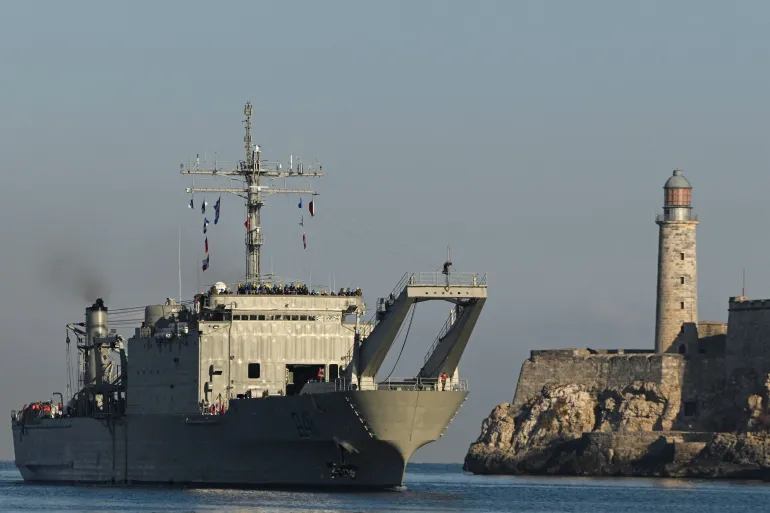
Two Mexican ships bearing humanitarian aid have docked in the harbour of Cuba’s capital Havana, as the United States continues its efforts to cut the island off from outside fuel supplies.
On Thursday, pedestrians on Havana’s seawall watched as the ships, one of which was the Papaloapan, unloaded white pallets on shore.
Mexican President Claudia Sheinbaum addressed the delivery in her morning news conference, promising that more help was on the way.
“We are sending different forms of help, different forms of support,” Sheinbaum said. “Today, the ships arrive. When they return, we are going to send more support of a different type.”
She also described her country’s role as “opening the doors for dialogue to develop” between Cuba and the US, but she insisted that maintaining Cuba’s sovereignty would be paramount among her priorities.
Since January, the administration of US President Donald Trump has sought to cut off the oil supplies that power Cuba’s energy grid and other critical infrastructure.
The campaign is part of a long-running series of sanctions imposed by the US on the Caribbean island nation, stretching back to the Cold War.
But the latest effort, under Trump, has experts at the United Nations warning of an imminent humanitarian “collapse” in Cuba, as oil supplies dwindle.
The oil embargo began on January 3, when Trump authorised a US military operation to attack Venezuela and abduct its then-leader, President Nicolas Maduro, and his wife Cilia Flores.
[Aljazeera]
-

 Life style1 day ago
Life style1 day agoMarriot new GM Suranga
-

 Midweek Review5 days ago
Midweek Review5 days agoA question of national pride
-

 Business5 days ago
Business5 days agoAutodoc 360 relocates to reinforce commitment to premium auto care
-

 Features1 day ago
Features1 day agoMonks’ march, in America and Sri Lanka
-

 Opinion4 days ago
Opinion4 days agoWill computers ever be intelligent?
-

 Features1 day ago
Features1 day agoThe Rise of Takaichi
-

 Features1 day ago
Features1 day agoWetlands of Sri Lanka:
-

 Midweek Review5 days ago
Midweek Review5 days agoTheatre and Anthropocentrism in the age of Climate Emergency










